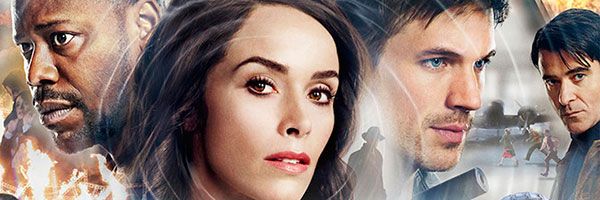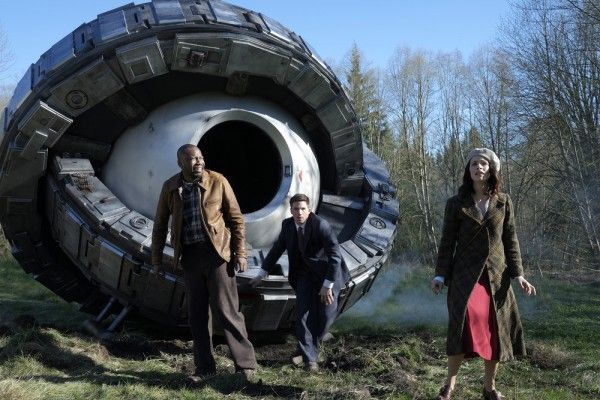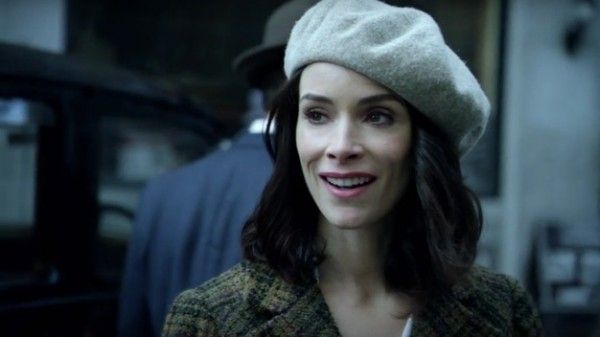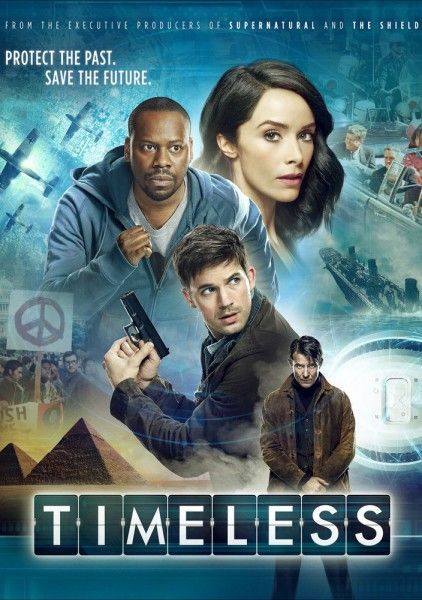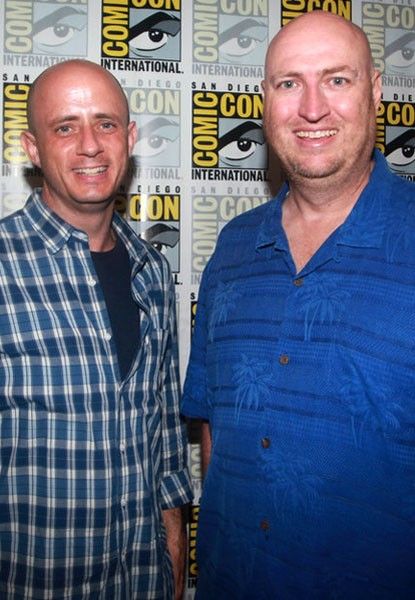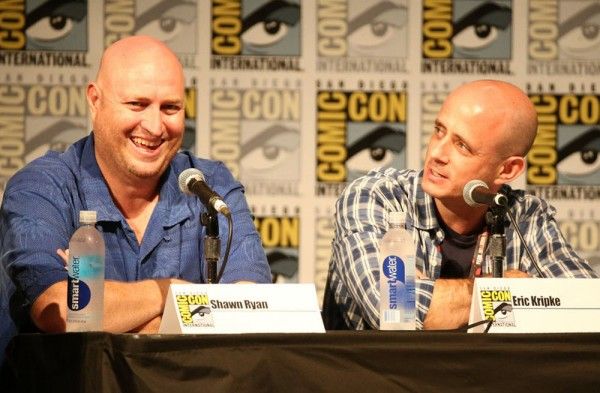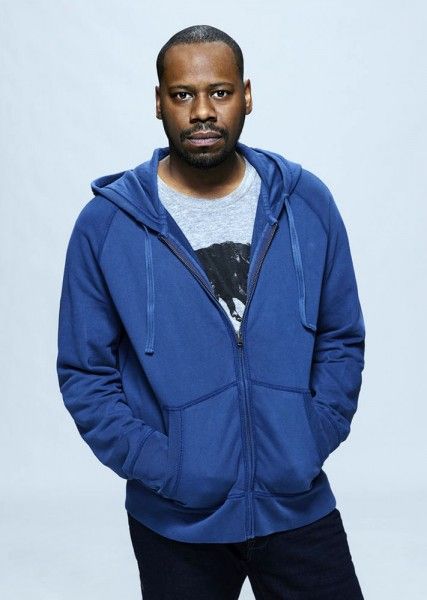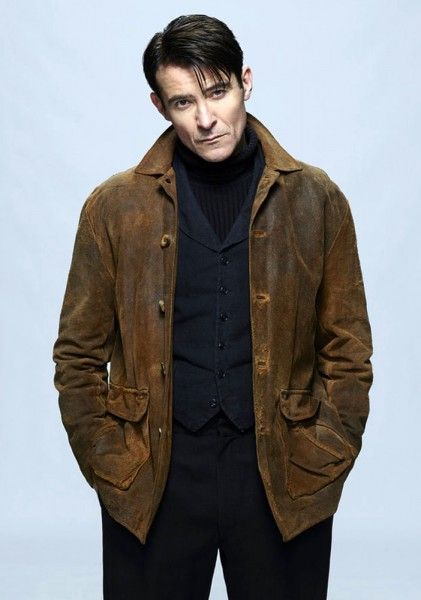From Eric Kripke (Supernatural) and Shawn Ryan (The Shield) comes the NBC drama series Timeless, a thrilling action-adventure about an unlikely team made up of a scientist (Malcolm Barrett), a soldier (Matt Lanter) and a history professor (Abigail Spencer), who use a secret time machine to track down a mysterious criminal (Goran Visnjic) intent on destroying America as we know it by changing things in the past. While they must make every effort not to affect the past themselves, they must figure out what the dangerous fugitive is up to before it’s too late.
During this exclusive interview with Collider, showrunners Eric Kripke and Shawn Ryan talked about making a show with something for everyone, balancing big adventure with character development, getting to explore eras they’ve always wanted to explore, why it was important not to have a typical villain, and how changes in history will affect the present.
Collider: Did you set out intending to make a big family show?
ERIC KRIPKE: Shawn and I each have families, and an interesting thing happens, at this stage in our careers, which is that you start thinking about creating something that you can all watch together. What I think networks do so well are big, fun, accessible, invite everybody into the tent kinds of storytelling, akin to an early Spielberg movie or a Michael Crichton novel. That’s not to say that there aren’t scary parts ‘cause there are, and that there aren’t sexy parts and edgy parts, just like early Spielberg would have, but there’s a lot of heart, a lot of emotion and complicated characters. We think there’s something for everyone.
This show has big, fun adventure and some really interesting character development. How do you find that balance, especially working on this with each other?
KRIPKE: Shawn and I are peanut butter and chocolate.
SHAWN RYAN: Eric and I have the potential to make one of the worst shows on TV, if you take my worst habits and combine them with his worst habits. But fortunately, I try to bring my best habits and he’s definitely brought his best habits. It’s been a really interesting partnership. We have two different approaches, and we found a way that works for both for us. It’s really nice to have a creative partner as smart and accomplished as [Eric]. Also, this production is so difficult. Pulling off what we’re trying to pull off, creating a different world each week and a different time period each week, has logistical aspects that would be very difficult to pull off, as a single showrunner. This is a show that requires two experienced showrunners, and we’re still barely keeping our noses above water. So far, the experience has been one of wonder, one of excitement, and one of apprehension at the size of the task in front of us, which mirrors what our main three characters are going through, in many ways.
Have you thought about giving yourself a break, at some point, and having the time machine break down, so that they can’t go anywhere for at least an episode?
KRIPKE: We are talking about a storyline where the time machine breaks down, but us being us, we’ve chosen one of the most difficult to shoot periods.
RYAN: In the middle of the French and Indian War.
KRIPKE: Exactly! Because it could break down at home, or it could break down in the middle of French and Indian War. There are so many shows out there, so you really need to work hard to separate yourself and cut through the static. While it’s very difficult and borderline insane to shoot, I think the audience is really going to be the beneficiary of a show that one week is the assassination of Abraham Lincoln, and then the very next week is Sinatra’s Vegas. This insane idea that we’re trying to pull off, really came to life for me when we were up in Vancouver shooting 1865 Washington. Abigail [Spencer], who plays Lucy Preston, was wearing this unbelievably amazing and elaborate 1865 gown with a bustle, and I saw that and thought to myself, “The last time I saw you, you were in a very simple 1937 dress. Next time I see you, you’re going to be in a 1962 cocktail dress.” The variety of style that this show is going to have, every single week, I think is going to be really exciting. Let’s be honest, any show will live or die based on how good the characters are, how good the actors are, how complicated the relationships are, how grounded they are and how much heart they have, but we feel we’re delivering on that too, and that’s, in large part, because of Shawn Ryan’s involvement. Partnering with Shawn has been, I don’t want to say shockingly smooth, but that. I’ve been learning so much from him, and it’s been a real pleasure watching his focus on character. It’s been a really educational, positive experience.
Are any of the eras you’re exploring things that you wanted to delve into previously, but just couldn’t find a way to do it before?
RYAN: Our third episode takes place in 1962 Las Vegas with the Rat Pack. That’s always been a time period and thing that I was fascinated with, and I never had a chance to do that story on The Shield or The Unit, or anything like that. I’ve always read a lot of historical books and I’m a big fan of documentaries, and I’ve always thought of ways to do it, but a lot of these aren’t necessarily ideas or time periods that you want to base an entire show around, for 60, 80 or 100 episodes. We can tell a story for an hour and milk it for as much as we can, and then get out and say, “Okay, in the next episode, we’re going to Germany in World War II.” What’s really fun is to be able to take these worlds that might not work as a series, but definitely will work for an episode.
KRIPKE: Because of Supernatural, I was able to go to all of the time periods that I was interested in going to. I was able to do a Western and a gangster story. I did the Robert Johnson story about blues. I’ve been able to explore all of that. The way I really approached Timeless, you know that a show is going to be good and fun to work on, if the research is interesting. I really am a very research-oriented writer and I really like to attack it from that perspective. I like to find ideas where the research is going to be fun. So, the real pleasure of this show is that we have a historian in the room with us, and learning from him about these characters and stories in history that are amazing, violent, visceral and absurd, and that nobody knows, and being able to present to the audience not only the iconic moments in history, but all of the moments they haven’t heard of, has really been fascinating.
This villain isn’t your typical villain. Why was that important to you?
RYAN: I don’t even like to call him a villain. Certainly, when we spoke to Goran [Visnjic] about playing the role, our pitch wasn’t, “Hey, come play a great villain.” It was, “Hey, come be the hero of your own story. You’re going to be the antagonist that our leads are fighting against, but it’s going to be more complicated than you just being a bad guy.” We talked a lot about the backstory for that character and why we thought it was a complicated, interesting, and in some ways unsympathetic, but in other ways sympathetic character to play. Great actors – and Goran certainly is one – want to play the shades of gray. They don’t want to play black and white. So, what we’ve tried to do is give him a character that really lives in the gray, and then let him swim around in that. Over time, you’re gonna see different sides of him. My hope is that the audience will feel torn occasionally. They’re going to root for our heroes, but they might root for our heroes to protect or save Flynn, at some point, or understand more what he’s going through. That, to me, is when an antagonist gets really interesting.
KRIPKE: There’s a lot more to his story that will be unpeeled and revealed, as the series continues.
We see that things can change in the present, if things happen in the past. How much of an effect will we see, in that regard?
KRIPKE: It was Shawn’s idea, for that twist at the end of the pilot. What’s so brilliant about that idea is that it has a catastrophic effect on one of the character’s lives, but it’s very personal. Outside of that house, no one would know there was ever a change. It’s a good example, moving forward, of how we can adjust history on this show. It’s always better to go personal and painful than to go big. The stakes are incredibly high for our heroes, but not in a way where they’re going to come back to New York and dinosaurs with swastika armbands are going to be marching down 5th Avenue. We want a really grounded, real show. If they end up screwing up in the past, they could come back to a present where, even if the world looks the same, very personal things could be different and that would be horrific.
Timeless airs on Monday nights on NBC.

